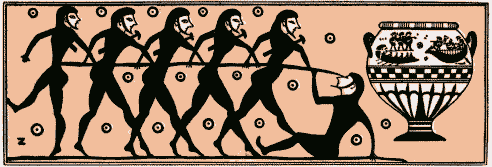Virtue in the Heroic Society

1. Classical cultures educated morally through stories, offering examples to emulate and to avoid.
The Odyssey is intended to tell us something about what a just society is. As we examine the role that each character plays in their culture, we learn something about what Greek culture expects of them.
2. Each person has a role in society, an understanding of what is due to others, the ability to do it, and is subject to judgment concerning it.
polis: "a moral community with a particular goal, the life of virtue." This particular definition was advanced by Aristotle, but it is not necessarily anachronistic to apply it to early heroic culture as well. Consider how the customs and regulations surrounding warfare, hospitality, and heroism in general work together to achieve a certain kind of society.
3. Arete: "Excellence." Specifically, the excellence needed to sustain a society. People must obtain excellence so their culture will continue to exist. Arete is thus the qualities that enable one to carry out one’s role.
Odysseus and Penelope have guile (dolos), Nestor wisdom, Meneleus leadership. Each of these has a particular arete that makes his particular kind of success possible. What particular excellence would you assign to the bard Demodokos or the Phaiakian ruler Alkinoos?
Two other important terms: aristeia: the exploits thru which a warrior merits respect from comrades. kleos: the glory gained by action. How does Odysseus achieve aristeia and kleos among the Phaiakians?
4. Courage means being reliable to one's friends and their households. One can be counted on to perform her or his role in the face of danger, death, and fate.
Note how Odysseus in describing his journey stresses his own courage, cunning, and strength.
5. Fate is irreversible. Death is awaited by all.
What are some examples of Fate in The Odyssey?
6. Therefore, one’s identity, one’s story, is bound up with the narrative of one’s life from birth to death. Death is the final defeat for the Homeric hero.
No character in Homer's works expects to live forever. The underworld is a kind of living death. What does Achilles observe about death to Odysseus? How would you characterize Odysseus' journey to the underworld?
7. The only thing than death worse is slavery, because to be a slave is to be outside the community.
Not all servants, however, fall into this class of individuals. Notice how Odysseus treats Eumaios the swineherd, as well as Philoitios the cattleherd.
8. The poet has a unique perspective. The poet knows that sometimes winning is defeat and that death is heroic victory.
This point may not comfortably apply to The Odyssey?
